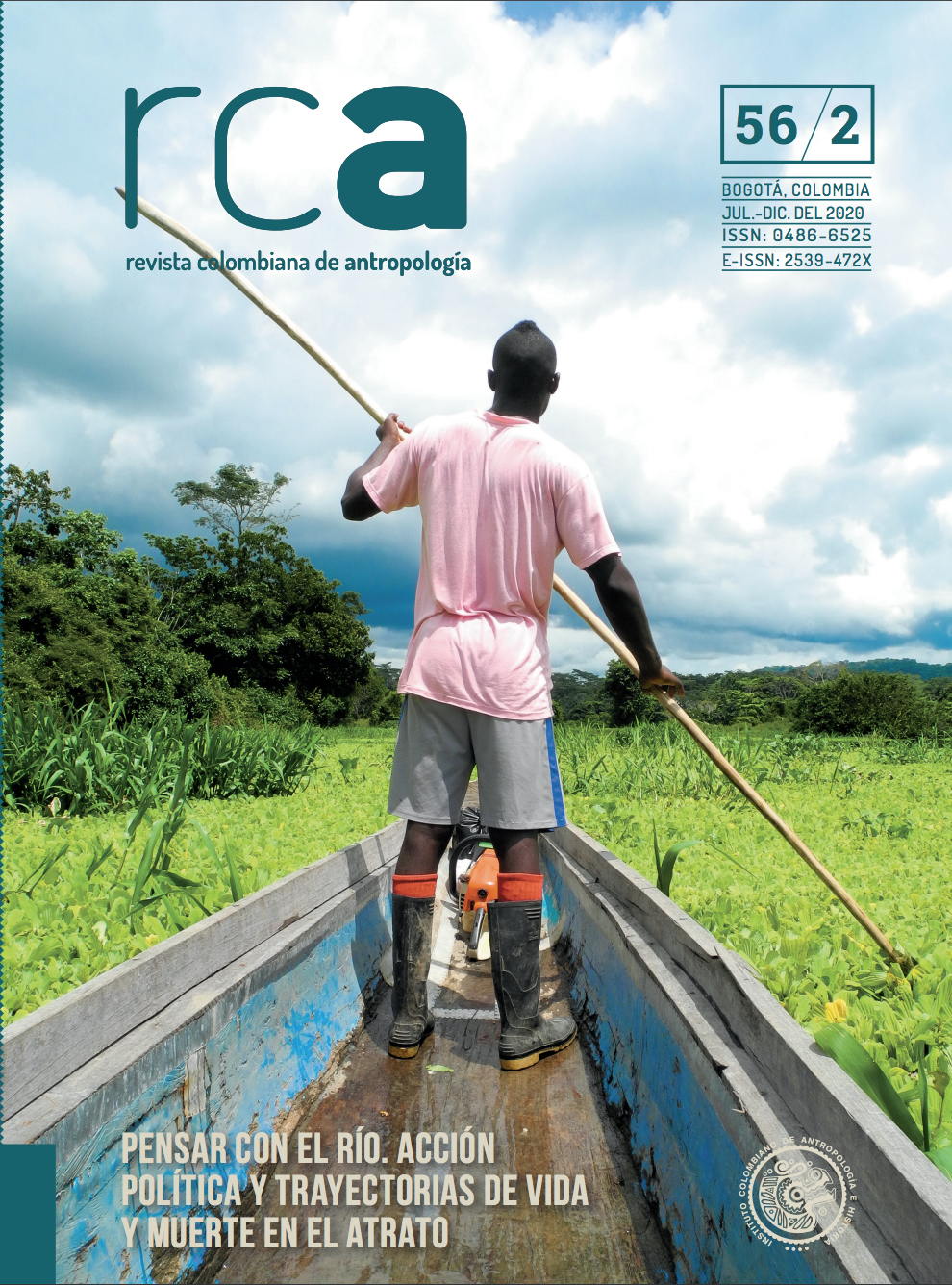The Atrato River and its Guardians: Ecopolitical Imagination for Weaving New Rights
DOI:
https://doi.org/10.22380/2539472X.638Keywords:
biocultural rights, mining, rivers, ChocóAbstract
Judgment T-622 of 2016 of the Constitutional Court that recognizes the Atrato basin as an entity subject to rights represents an unprecedented opportunity for the ecopolitical imagination in Colombia. This recognition poses challenges as it requires translation and representation work to define the effective rights of the basin. Part of this work has been carried out by the Guardians of the Atrato who are in charge of the recognition and safeguard of rights not yet specified. In this paper, we address the issue of river rights not only as a problem of legal representation but also as an eco-political exercise that seeks to tie, in novel ways, lives, practices and knowledges that flourish throughout the Atrato.
Downloads
References
Aguirre, Jorge. 2017. “La democracia líquida: exigencia de la sustentabilidad eco-política”. Araucaria. Revista Iberoamericana de Filosofía, Política y Humanidades 19 (38): 73-96. https://revistascientificas.us.es/index.php/araucaria/article/view/2862 DOI: https://doi.org/10.12795/araucaria.2017.i38.04
Aprile-Gniset, Jaques. 1993. Poblamiento, hábitats y pueblos del Pacífico. Cali: Ediciones Universidad del Valle.
Benjamin, Walter. 1973. Tesis de filosofía de la historia. Madrid: Taurus.
Bocarejo, Diana. 2018. “Gobernanza del agua: pensar desde las fluctuaciones, los enmarañamientos y políticas del día a día”. Revista de Estudios Sociales 63: 111-118. https://doi.org/10.7440/res63.2018.09 DOI: https://doi.org/10.7440/res63.2018.09
Chakrabarty, Dipesh. 2009. “The Climate of History. Four Theses”. Critical Inquiry 35: 197-222. https://doi.org/10.1086/596640 DOI: https://doi.org/10.1086/596640
Clark, Nigel. 2014. “Geo-Politics and the Disaster of the Anthropocene”. The Sociological Review 62 (1): 19-37. https://doi.org/10.1111/1467-954X.12122 DOI: https://doi.org/10.1111/1467-954X.12122
Escobar, Arturo. 2007. La invención del tercer mundo: construcción y deconstrucción del desarrollo. Caracas: Fundación Editorial el Perro y la Rana.
Galindo, María Isabel. 2018. “Viviendo con el mar. Inestabilidad litoral y territorios en movimiento en La Barra, Pacífico colombiano”. Revista Colombiana de Antropología 55 (1): 29-57. https://doi.org/10.22380/2539472X.569
Gudynas, Eduardo. 2014. Derechos de la naturaleza. Ética biocéntrica y políticas ambientales. Lima: PDTG; redGe; CooperAcción; Claes.
Guimarães, Roberto. 1989. “La ecopolítica en el desarrollo del Brasil”. Revista de la Cepal 38: 89-104.
Haraway, Donna. 2008. When Species Meet. Minneapolis; Londres: University of Minnesota Press.
—. 2015. “Anthropocene, Capitalocene, Plantationocene, Chthulucene: Making Kin”. Environmental Humanities 6: 159-165. https://doi.org/10.1215/22011919-3615934 DOI: https://doi.org/10.1215/22011919-3615934
—. 2016. Staying with the Trouble. Making Kin in the Chthulucene. Durham; Londres: Duke University Press.
Isacsson, Sven-Erik. 1975. “Biografía atrateña. La formación de un topónimo indígena bajo el impacto español (Chocó, Colombia)”. Indiana 3: 93-109. http://dx.doi.org/10.18441/ind.v3i0.93-110
Kothari, Ashish y Shrishtee Bajpai. 2018. “¿Somos el río, o en el río somos?”. Ecología Política 55: 32-40. https://www.ecologiapolitica.info/?p=10746
LaDanta LasCanta. 2017. “El Faloceno: redefinir el Antropoceno desde una mirada ecofeminista”. Ecología Política 53: 26-33. https://www.ecologiapolitica.info/?p=9705
Lahiri-Dutt, Kuntala. 2019. “Imaginando los ríos”. Revista Colombiana de Antropología 55 (1): 153-166. https://doi.org/10.22380/2539472X.574
Latour, Bruno. 2007. Nunca fuimos modernos. Ensayo de antropología simétrica. Madrid: Siglo XXI.
Leal, Claudia. 2016. “Libertad en la selva. La formación de un campesinado negro en el Pacífico colombiano, 1850-1930”. Revista CS 20: 15-36. https://doi.org/10.18046/recs.i20.1861 DOI: https://doi.org/10.18046/recs.i20.1861
Losonczy, Anne-Marie. 2006. La trama interétnica. Ritual, sociedad y figuras de intercambio entre los grupos negros y embera del Chocó. Bogotá: ICANH; IFEA. DOI: https://doi.org/10.4000/books.ifea.4695
Lyons, Kristina. 2018. “Rivers Have Memory: Community Recovery of a Watershed in Times of Perpetual Conflict and Transition”. Ponencia presentada en el Congreso de la American Anthropology Association, San Jose, California, 14-17 de noviembre.
Mcpherson, Elizabeth y Felipe Clavijo Ospina. 2018. “The Pluralism of River Rights in Aotearoa, New Zealand and Colombia”. Journal of Water Law 25 (6): 283-293.
Motta, Nancy. 2005. Gramática ritual. Territorio, poblamiento e identidad afropacífica. Cali: Universidad del Valle.
Oslender, Ulrich. 2002. “‘The Logic of the River’: A Spatial Approach to Ethnic-Territorial Mobilization in the Colombian Pacific Region”. Journal of Latin American Anthropology 7 (2): 86-117. https://doi.org/10.1525/jlca.2002.7.2.86 DOI: https://doi.org/10.1525/jlca.2002.7.2.86
—. 2008. Comunidades negras y espacio en el Pacífico colombiano. Hacia un giro geográfico en el estudio de los movimientos sociales. Bogotá: Universidad Colegio Mayor de Cundinamarca; ICANH; Universidad del Cauca.
Quiceno, Natalia. 2016. Vivir sabroso. Luchas y movimientos afroatrateños en Bojayá, Chocó, Colombia. Bogotá: Editorial Universidad del Rosario. DOI: https://doi.org/10.12804/th9789587387506
Serres, Michel. 2004. El contrato natural. Valencia: Pre-Textos.
Stutzin, Godofredo. 1984. “Un imperativo ecológico: reconocer los derechos de la naturaleza”. Ambiente y Desarrollo 1 (1): 97-114.
Szerszynski, Bronislaw. 2012. “The End of the End of Nature: The Anthropocene and the Fate of the Human”. The Oxford Literary Review 34 (2): 165-184. www.jstor.org/stable/44030881 DOI: https://doi.org/10.3366/olr.2012.0040
Tierra Digna. 2016. La minería en Chocó en clave de derechos. Investigación y propuestas para convertir la crisis socio-ambiental en paz y justicia territorial. Bogotá: Tierra Digna.
Tsing Lowenhaupt, Anna. 2015. The Mushroom at the End of the World. On the Possibility of Life in Capitalist Ruins. Princeton; Oxford: Princeton University Press. DOI: https://doi.org/10.1515/9781400873548
Valencia, Inge y Sabina Rasmussen. 2018. Entre las rentas ilegales, el recrudecimiento de la violencia y la implementación escasa de los programas de desarrollo con enfoque territorial. Bogotá: Fescol.
Vince, Gaia. 2014. Adventures in the Anthropocene. A Journey to the Heart of the Planet We Made. Minneapolis: Milkweed Editions.
Wade, Peter. 2006. “Etnicidad, multiculturalismo, y políticas sociales en Latinoamérica: poblaciones afrolatinas (e indígenas)”. Tabula Rasa 4: 59-81. http://www.scielo.org.co/pdf/tara/n4/n4a04.pdf DOI: https://doi.org/10.25058/20112742.247
West, Robert. 2000. Las tierras bajas del Pacífico colombiano. Bogotá: ICANH.
Zalasiewicz, Jan, Mark Williams, Alan G. Smith, Tiffany L. Barry, Angela L. Coe, Paul R. Bown, Patrick Brenchley, David Cantrill, Andrew Gale, Philip Gibbard, F. John Gregory, Mark W. Hounslow, Andrew C. Kerr, Paul Pearson, Robert Knox, John H. Powell, Colin Neil Waters, John E. A. Marshall, Michael Oates, Peter Rawson y Philip
Stone. 2008. “Are We Now Living in the Anthropocene?”. GSA Today 18 (2): 4-8. https://doi.org/10.1130/GSAT01802A.1 DOI: https://doi.org/10.1130/GSAT01802A.1




















